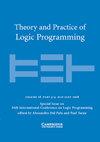Symbolic Specialization of Rewriting Logic Theories with Presto
IF 1.1
2区 数学
Q3 COMPUTER SCIENCE, SOFTWARE ENGINEERING
引用次数: 0
Abstract
This paper introduces $\tt{{Presto}}$ , a symbolic partial evaluator for Maude’s rewriting logic theories that can improve system analysis and verification. In $\tt{{Presto}}$ , the automated optimization of a conditional rewrite theory $\mathcal{R}$ (whose rules define the concurrent transitions of a system) is achieved by partially evaluating, with respect to the rules of $\mathcal{R}$ , an underlying, companion equational logic theory $\mathcal{E}$ that specifies the algebraic structure of the system states of $\mathcal{R}$ . This can be particularly useful for specializing an overly general equational theory $\mathcal{E}$ whose operators may obey complex combinations of associativity, commutativity, and/or identity axioms, when being plugged into a host rewrite theory $\mathcal{R}$ as happens, for instance, in protocol analysis, where sophisticated equational theories for cryptography are used. $\tt{{Presto}}$ implements different unfolding operators that are based on folding variant narrowing (the symbolic engine of Maude’s equational theories). When combined with an appropriate abstraction algorithm, they allow the specialization to be adapted to the theory termination behavior and bring significant improvement while ensuring strong correctness and termination of the specialization. We demonstrate the effectiveness of $\tt{{Presto}}$ in several examples of protocol analysis where it achieves a significant speed-up. Actually, the transformation provided by $\tt{{Presto}}$ may cut down an infinite folding variant narrowing space to a finite one, and moreover, some of the costly algebraic axioms and rule conditions may be eliminated as well. As far as we know, this is the first partial evaluator for Maude that respects the semantics of functional, logic, concurrent, and object-oriented computations.用Presto重写逻辑理论的符号专门化
本文介绍了Maude重写逻辑理论的符号部分求值器$\tt{{Presto}}$,它可以提高系统的分析和验证能力。在$\tt{{Presto}}$中,条件重写理论$\mathcal{R}$(其规则定义系统的并发转换)的自动优化是通过对$\mathcal{R}$的规则进行部分求值来实现的,该规则是对$\mathcal{R}$的规则进行部分求值的,该规则指定$\mathcal{R}$的系统状态的代数结构。当插入到主机重写理论$\mathcal{R}$时,这对于专化一个过于一般的方程理论$\mathcal{E}$特别有用,该理论的运算符可能服从结合性、交换性和/或恒等公理的复杂组合,例如,在协议分析中,使用复杂的加密方程理论。$\tt{{Presto}}$实现了不同的展开运算符,这些运算符基于折叠变型窄化(Maude方程理论的符号引擎)。当与适当的抽象算法相结合时,它们允许专门化适应理论终止行为,并在确保专门化的强正确性和终止性的同时带来显著的改进。我们在几个协议分析示例中演示了$\tt{{Presto}}$的有效性,在这些示例中,它实现了显著的加速。实际上,$\tt{{Presto}}$提供的变换可以将无限的折叠变型缩小到有限的空间,而且可以省去一些代价高昂的代数公理和规则条件。据我们所知,这是Maude的第一个部分求值器,它尊重函数式、逻辑、并发和面向对象计算的语义。
本文章由计算机程序翻译,如有差异,请以英文原文为准。
求助全文
约1分钟内获得全文
求助全文
来源期刊

Theory and Practice of Logic Programming
工程技术-计算机:理论方法
CiteScore
4.50
自引率
21.40%
发文量
40
审稿时长
>12 weeks
期刊介绍:
Theory and Practice of Logic Programming emphasises both the theory and practice of logic programming. Logic programming applies to all areas of artificial intelligence and computer science and is fundamental to them. Among the topics covered are AI applications that use logic programming, logic programming methodologies, specification, analysis and verification of systems, inductive logic programming, multi-relational data mining, natural language processing, knowledge representation, non-monotonic reasoning, semantic web reasoning, databases, implementations and architectures and constraint logic programming.
 求助内容:
求助内容: 应助结果提醒方式:
应助结果提醒方式:


